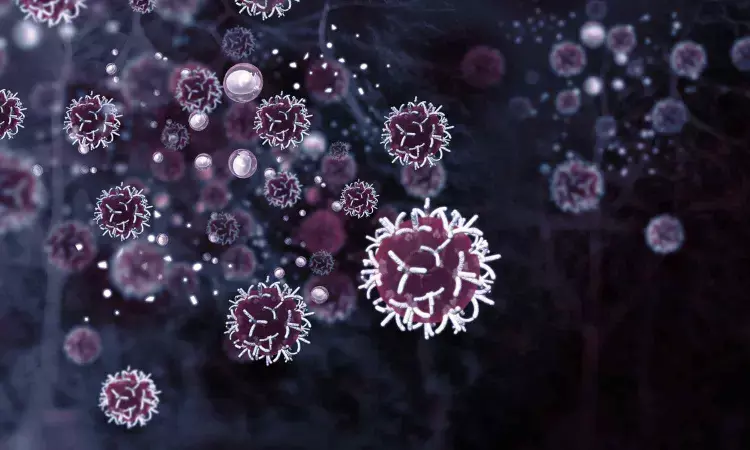- Home
- Medical news & Guidelines
- Anesthesiology
- Cardiology and CTVS
- Critical Care
- Dentistry
- Dermatology
- Diabetes and Endocrinology
- ENT
- Gastroenterology
- Medicine
- Nephrology
- Neurology
- Obstretics-Gynaecology
- Oncology
- Ophthalmology
- Orthopaedics
- Pediatrics-Neonatology
- Psychiatry
- Pulmonology
- Radiology
- Surgery
- Urology
- Laboratory Medicine
- Diet
- Nursing
- Paramedical
- Physiotherapy
- Health news
- Fact Check
- Bone Health Fact Check
- Brain Health Fact Check
- Cancer Related Fact Check
- Child Care Fact Check
- Dental and oral health fact check
- Diabetes and metabolic health fact check
- Diet and Nutrition Fact Check
- Eye and ENT Care Fact Check
- Fitness fact check
- Gut health fact check
- Heart health fact check
- Kidney health fact check
- Medical education fact check
- Men's health fact check
- Respiratory fact check
- Skin and hair care fact check
- Vaccine and Immunization fact check
- Women's health fact check
- AYUSH
- State News
- Andaman and Nicobar Islands
- Andhra Pradesh
- Arunachal Pradesh
- Assam
- Bihar
- Chandigarh
- Chattisgarh
- Dadra and Nagar Haveli
- Daman and Diu
- Delhi
- Goa
- Gujarat
- Haryana
- Himachal Pradesh
- Jammu & Kashmir
- Jharkhand
- Karnataka
- Kerala
- Ladakh
- Lakshadweep
- Madhya Pradesh
- Maharashtra
- Manipur
- Meghalaya
- Mizoram
- Nagaland
- Odisha
- Puducherry
- Punjab
- Rajasthan
- Sikkim
- Tamil Nadu
- Telangana
- Tripura
- Uttar Pradesh
- Uttrakhand
- West Bengal
- Medical Education
- Industry
Fiber diet may delay a type of blood cancer, reveals research

Today researchers at Memorial Sloan Kettering Cancer Center (MSK) reported results from the first ever clinical trial to show that a high fiber plant based dietary intervention may delay progression to multiple myeloma, a type of rare, incurable blood cancer affecting the bone marrow. The study enrolled 20 participants with a precancerous blood disorder and an elevated body mass index (BMI) at risk for developing multiple myeloma. They received 12 weeks of high fiber plant-based meals and 24 weeks of coaching. Two participants with progressing disease prior to study showed a significant improvement of their disease progression trajectory. Additionally, at one year after enrollment, none of the participants had progressed to multiple myeloma. MSK myeloma specialist and NUTRIVENTION study lead, Urvi Shah, MD, presented these findings at the 2024 American Society of Hematology (ASH) annual meeting in San Diego, California.
"This study showcases the power of nutrition-specifically a high fiber plant-based diet-and unlocks a better understanding of how it can lead to improvements in the microbiome and metabolism to build a stronger immune system,” said Dr. Shah. “These findings further support how we as physicians can empower patients, especially those with precancerous conditions, with knowledge on reducing their cancer risk through dietary changes.”
Multiple myeloma is the second most common blood cancer and typically arises from precursor conditions called monoclonal gammopathy of undetermined significance (MGUS) and smoldering (symptomless) myeloma. Recent studies have shown an increased risk of multiple myeloma in individuals with poor diet quality and reduced intake of plant foods. Additionally, individuals with these conditions and an elevated body mass index (BMI) are twice as likely to progress to multiple myeloma as people with these conditions and a normal BMI. With this information, researchers have been looking for ways to intervene before these conditions can progress to cancer.
During the study, participants were encouraged to eat as much as they wanted if it was whole plant-based foods such as fruits, vegetables, nuts, seeds, whole grains, and legumes. With these dietary changes there were significant improvements in quality of life, insulin resistance, gut microbiome health and inflammation. On average, participants lost eight percent of their body weight after 12 weeks. Following these positive results, Dr. Shah is currently enrolling for a larger, multi-center study with 150 participants called NUTRIVENTION-3.
These findings were confirmed in a smoldering myeloma mouse model where 44% of mice fed the high fiber diet did not progress to myeloma compared to the standard diet where all mice progressed to myeloma.
Reference:
New study reveals a fiber diet may delay a type of blood cancer, Memorial Sloan Kettering Cancer Center, Meeting: 66th American Society of Hematology (ASH) Annual Meeting and Exposition.
Dr Kamal Kant Kohli-MBBS, DTCD- a chest specialist with more than 30 years of practice and a flair for writing clinical articles, Dr Kamal Kant Kohli joined Medical Dialogues as a Chief Editor of Medical News. Besides writing articles, as an editor, he proofreads and verifies all the medical content published on Medical Dialogues including those coming from journals, studies,medical conferences,guidelines etc. Email: drkohli@medicaldialogues.in. Contact no. 011-43720751


